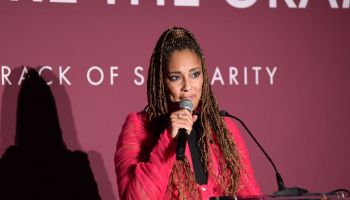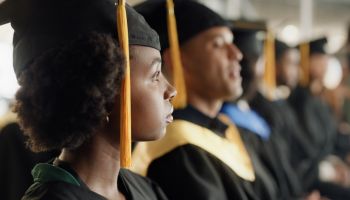Most Black girls in Oakland, California are behind academically, and many are headed toward failure in life. It’s no easy task to overcome the disadvantages they begin life with and to navigate the numerous pitfalls along the way.
The Oakland Unified School District (OUSD) launched the highly successful Manhood Development Program for Black boys in 2010, with a mission to decrease suspensions, incarcerations and the achievement gap—all while increasing attendance, graduation rates and literacy.
The success of the manhood program sheds a spotlight on what’s missing: a similar program for the school district’s Black girls. Indeed, Black girls nationwide tend not to get the same attention and resources that Black boys get. But that’s changing in Oakland, where an achievement program for Black girls is taking shape.
Black Girls Achievement Program Launched
In 2015, OUSD partnered with the Alliance for Girls to examine the experience of girls in the school district. The report, Valuing Girls Voices: The Lived Experience of Girls of Color in OUSD, reported disturbing results.
African-American girls represent one out of every three girls in the district but two out of every three girls suspended. Almost half (46 percent) of all chronically absent girls in the school district is African-American.
Given those findings, it’s no surprise that the girls are academically in trouble. By the ninth-grade, only 26.7 percent of them read at grade level, according to data from OUSD’s Office of Equity.
“The numbers are extremely alarming. It’s really scary,” Nzingha Dugas, who’s tapped to spearhead the reversal, told NewsOne.
OUSD hired Dugas, the previous director of UC Berkeley’s African American Student Development Office, in mid-September to direct its African-American Girls & Young Women Achievement program, which launched last fall. She has been on an extended listening tour.
Listening Tour
Dugas said a group of women and girls told school officials in 2015 that girls in the district urgently need a program and resources. So, she has been holding community forums to hear their concerns and ideas.
Here’s a picture of what it’s like being a Black girl in the school district, from The Valuing Girls Voices survey:
“African American girls do not experience OUSD schools as caring environments, citing numerous examples of unconscious and conscious bias, low expectations and abusive language coming from adults and peers. African American girls were the only ethnic group that consistently perceived and experienced schools as ‘not seeing us for who we are’ and treating them unfairly. African American girls shared experiences of exclusion from the classroom and the disparate application of disciplinary action on the basis of race.”
Dugas’ tour highlights positive finds: such 631 of the girls made the honor roll, and many of them are career minded ( 27 percent are focused on pursing the health science).
The challenges they face, however, are complex and profound. Many of the girls come from low-income, single-parent homes. Some are transient, as their families struggle to obtain affordable housing in increasingly expensive Oakland, where the population of African-American families has significantly decreased.
At the same time, they’re vulnerable to the rampant sex trafficking that flourishes in Oakland. A report from the National Women’s Law Center calls the city a “a hub” in the child sex trade, where approximately 100 children are sold every night, including girls as young as 12 years old. It’s a problem that OUSD is trying to tackle.
Black Girls Left Behind No More
Oakland’s school district, like many others across the nation, is awakening to the challenges Black girls face. There’s a strong emphasis on helping Black boys avoid the school-to-prison pipeline. That effort tends to overshadow the less realized fact that Black girls also find themselves in the pipeline, which leads to the justice system instead of college.
Data from the U.S. Department of Education show that African-American K-12 students are 3.8 times more likely to receive one or more out-of-school suspensions as White students. Black girls are suspended from school at six times the rate of White girls, compared to Black boys who are suspended three times more than White boys.
Much of the girls’ program will be modeled on the district’s African-American Male Achievement program. Dugas said she observed classrooms in the boys’ program and was very impressed.
She recalled the positive engagement between teachers and pupils during a visit. The teacher acknowledged each student who walked into the room, making eye contact with each boy, and took the time to unpack the weekend Monday morning before going into a lesson.
The boys motivated each other during class and discussed the lesson at a high level. At the end of class, they each thanked Dugas for joining them.
“It all unfolded in an environment of no punishment for the normal things boys do,” Dugas said. “We’re going to mirror all of that.”

Source: fstop123 / Getty
Community Involvement A Major Part Of The Solution
Setting at-risk girls on track toward success is a huge challenge. “This is a complex issue,” Dugas stated. “I see a lot of trauma that the girls are dealing with. We can’t isolate a single issue. It requires a comprehensive approach.”
She wants to “get back to what we know, and apply it to 21st century education.” One of those elements is reconnecting schools with their local community, which she said has been “100 percent behind us,” dispelling what Dugas said is a fallacy that the Black community doesn’t care about education.
There’s a broader national movement underway through a coalition led by the University of Phoenix and the National Action Network to reconnect the Black community and local schools. The coalition’s efforts launched with a focus on four cities: Atlanta, Baltimore, Richmond, Virginia and Columbia, South Carolina.
Classes are slated to launch in full for the 2017-2018 school year. In the meantime, Dugas is building a foundation that includes elders from the community who have a lifetime of wisdom to share. It will take the entire village to help set the girls on the right track.
SEE ALSO:
How To Stop The Criminalization Of Black Girls In Our Schools
White House Releases ‘Advancing Equity for Women and Girls of Color’ Report

























